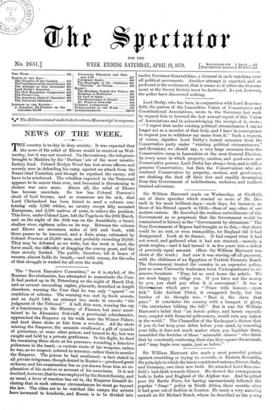Sir William Harcourt also made a most powerful protest against
overriding or trying to override, in Eastern Roumelia, the principle to which the latest constituted nations, Greece, Italy, and Germany, owe their new birth. He attacked Lord Beacons- field's bad-faith towards Greece. He showed the consequences both to India and England of the Afghan war. And he pitied poor Sir Bartle Frere, for having unconsciously followed the popular " Jingo " policy in South Africa, three months after it had gone out of fashion in London. He made a very amusing assault on Sir Michael Beach, whom he described as the young
Canning of the Colonial Office, who was quite unable to keep his " prancing Proconsuls " in South Africa in order, and he quoted, from an attack of Mr. Disraeli's on Lord Palmerston, a censure which seemed almost conceived by some one who was thinking of his own Government at the present moment:—" His external system is turbulent and aggressive, that his rule at home may be tranquil and unassailed. Hence arises excessive expenditure, heavy taxation, and the stoppage of all social im- provement." Sueh was Mr. Disraeli's criticism of Lord Palmer. ston. What would be Lord Palmerston's criticism of Mr. Disraeli ? Sir W. Harcourt did not suggest it, but we think it would be that while he had imitated his greater predecessor's grand dictatorial style, he had not imitated him at all events, in the art of avoiding being found out.



































 Previous page
Previous page